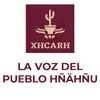Indigenous music Live Radio Stations
Radio Stations
- 3KND "Kool && Deadly" 1503 Melbourne, VIC

- 4AAA "98.9FM" Brisbane, QLD4AAA "98.9FM" Brisbane, QLD
- La Voz de la Sierra de Zongolica - 1360 AM - XEZON-AM - INPI (Instituto Nacional de los Pueblos Indígenas) - Zongolica, Veracruz

- La Voz de la Sierra Juárez (Guelatao) - 88.3 FM / 780 AM - XHGJO-FM / XEGLO-AM - INPI (Instituto Nacional de los Pueblos Indígenas) - Guelatao, OA

- La Voz de los Chontales - 98.7 FM - XHCPBS-FM - INPI (Instituto Nacional de los Pueblos Indígenas) - Nacajuca, TB

- La Voz de los Mayas (Peto) - 105.5 FM / 730 AM - XHPET-FM / XEPET-AM - INPI (Instituto Nacional de los Pueblos Indígenas) - Peto, Yucatán

- La Voz de los Tres Ríos (Etchojoa) - 700 AM - XEETCH-AM - INPI (Instituto Nacional de los Pueblos Indígenas) - Etchojoa, SO

- La Voz de los Vientos (Copainalá) - 1210 AM - XECOPA-AM - INPI (Instituto Nacional de los Pueblos Indígenas) - Copainalá, Chiapas

- La Voz del Pueblo Hñähñú (Cardonal) - 89.1 FM / 1480 AM -XHCARH-FM / XECARH-AM - INPI (Instituto Nacional de los Pueblos Indígenas) - Cardonal, HG

- Las Tres Voces de Durango (Santa María Ocotán) - 960 AM - XETPH-AM - INPI (Instituto Nacional de los Pueblos Indígenas) - Santa María Ocotán, DG

- Native Voice One

Choose a Genre
Indigenous music is a vibrant and deeply meaningful genre that represents the traditional sounds of native cultures across the globe. Rooted in a profound connection to the land, indigenous music serves not only as entertainment but as a vital expression of spiritual beliefs, cultural identity, and history. This genre is distinguished by the use of traditional instruments, unique vocal techniques, and storytelling that has been passed down through generations.
At the heart of indigenous music lies its intimate relationship with nature and place. Many indigenous communities view music as a conduit to communicate with the natural world, where specific songs and rhythms correspond to particular landscapes, seasons, or events. For instance, the Inuit people of Canada are renowned for their throat singing—a fascinating vocal art that mimics the sounds of the environment, such as the rustling wind, flowing water, and local wildlife. This practice exemplifies the way indigenous music often embodies the spirit of the land itself.
Spirituality is another cornerstone of indigenous music. For example, the Maori people of New Zealand incorporate traditional instruments like the taonga pūoro—a collection of wooden instruments—and perform chants and songs in the Maori language. Their music plays a crucial role in ceremonies and rituals, serving as a bridge between the physical world and their ancestors, underscoring music's sacred significance within the culture.
Radio stations dedicated to indigenous music provide an essential platform for both preserving these time-honored traditions and showcasing their evolution. They broadcast a rich mix of traditional sounds alongside contemporary indigenous artists, reflecting how these cultures adapt and innovate while staying true to their roots. Beyond music, these stations often include interviews with indigenous musicians and cultural leaders, along with news and discussions about indigenous issues, fostering a deeper understanding and awareness among listeners.
Importantly, indigenous music radio stations contribute significantly to cultural reconciliation and education. By amplifying indigenous voices and sharing their stories, these broadcasters help dismantle stereotypes and promote respect across diverse communities. The genre's power lies not just in its melodies but in its ability to connect people, preserve heritage, and inspire dialogue.
In summary, indigenous music is a powerful testament to the cultural heritage and spiritual traditions of native peoples worldwide. Through specialized radio stations, this rich musical legacy continues to thrive, fostering appreciation, respect, and unity across cultures.
At the heart of indigenous music lies its intimate relationship with nature and place. Many indigenous communities view music as a conduit to communicate with the natural world, where specific songs and rhythms correspond to particular landscapes, seasons, or events. For instance, the Inuit people of Canada are renowned for their throat singing—a fascinating vocal art that mimics the sounds of the environment, such as the rustling wind, flowing water, and local wildlife. This practice exemplifies the way indigenous music often embodies the spirit of the land itself.
Spirituality is another cornerstone of indigenous music. For example, the Maori people of New Zealand incorporate traditional instruments like the taonga pūoro—a collection of wooden instruments—and perform chants and songs in the Maori language. Their music plays a crucial role in ceremonies and rituals, serving as a bridge between the physical world and their ancestors, underscoring music's sacred significance within the culture.
Radio stations dedicated to indigenous music provide an essential platform for both preserving these time-honored traditions and showcasing their evolution. They broadcast a rich mix of traditional sounds alongside contemporary indigenous artists, reflecting how these cultures adapt and innovate while staying true to their roots. Beyond music, these stations often include interviews with indigenous musicians and cultural leaders, along with news and discussions about indigenous issues, fostering a deeper understanding and awareness among listeners.
Importantly, indigenous music radio stations contribute significantly to cultural reconciliation and education. By amplifying indigenous voices and sharing their stories, these broadcasters help dismantle stereotypes and promote respect across diverse communities. The genre's power lies not just in its melodies but in its ability to connect people, preserve heritage, and inspire dialogue.
In summary, indigenous music is a powerful testament to the cultural heritage and spiritual traditions of native peoples worldwide. Through specialized radio stations, this rich musical legacy continues to thrive, fostering appreciation, respect, and unity across cultures.